Социальная ответственность университета. Рубрика в журнале - Университетское управление: практика и анализ
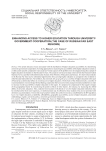
Статья научная
This article discusses issues associated with the facilitation of higher education accessibility by intensifying university-government cooperation. Existing approaches to measuring the accessibility of the higher education system as a whole and its specific components were analysed. Various aspects of the problem were investigated using the example of higher education institutions in the Russian Far East. The analysis was based on data retrieved from the Russian Federal Statistics Service and the Unified Information System of the Ministry of Education and Science. It is shown that residents in the Russian Far East receive substantial opportunities for accessing higher education as compared to the residents in other Russian federal districts. Nevertheless, the extremely low geographical accessibility of higher education in this part of Russia has a detrimental effect on overall access to higher education. On the basis of the obtained results, a number of recommendations were developed for facilitating cooperation between universities and governmental authorities in order to increase overall accessibility to higher education in this region. It is proposed to compensate for the negative impact of the geographical factor by maximizing the positive effects of other factors, for instance, by increasing the affordability of university education. Thus, students from locations with absent or very few higher education institutions may be reimbursed for their travel expenses, or reimbursement may be offered to those students who are not provided with dormitory accommodation. Universities may keep their tuition fees at the lowest rate as established by the RF legislation.
Бесплатно
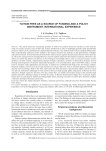
Tuition fees as a source of funding and a policy instrument: international experience
Статья научная
The article discusses conceptual grounds of tuition fee policies based on literature review and the study of country-specific cases of the USA, France and Russia in order to highlight general trends and identify practices which can be considered for implementation in Russia. The Authors believe that scholarly publications offer contradicting empirical results related to the impact of tuition fee policies on the performance of higher education institutes. Several theoretical frameworks such as human capital, demand and consumer choice theories as well as the concept of new managerialism are used to explain controversial empirical evidence. Moreover, the effects of tuition fee policies are proven to be contingent on multiple factors such as state governance system, dynamics of labor market, organizational design of higher education, maturity of financial assistance system, prestige and uniqueness of specific educational programs. It is concluded that, apart from PhD studies, overall trend is towards wider application and increase in tuition fees combined with high price for foreign students. Doctoral students in most cases do not pay tuition fees, but get salary for work in research projects conducted to develop new knowledge. Both in the USA and France the best education is provided by highly selective expensive private institutions (although in both countries there are high quality public education). In Russia the most attractive, though expensive for those who pay tuition fees, are public universities because they provide high quality education. Potential change in tuition fee policy in Russia should acknowledge that, in general, higher tuition fees are justified for studies providing higher future earnings. Increase in tuition fees should be coupled with more developed financial aid system.
Бесплатно
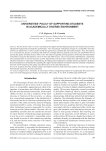
Universities’ policy of supporting students in academically diverse environment
Статья научная
The aim of this work is to review and analyse the support and development practices for students based on their educational background and academic performance. The increasingly widespread concept of a responsible university involves an opportunity to close or make smaller the gap between academically diversifi ed students. Thus, the purpose is to systematise the practice of working with both low and high-achieving students and assess the possibilities for improving the quality and effectiveness of this work. The analysis regarding existing practices of Russian and international universities is based on the literature review of more than 1600 sources. The review provides identifi cation, comparison and systematisation of common practices used by departments and universities rather than individual teachers. A classifi cation of practices at the stages of identifying, developing and evaluating low and high-achieving students is proposed. Recommendations are formulated for expanding the support and development of students under the conditions of academic diversity and for improving the quality and effectiveness of the educational process.
Бесплатно
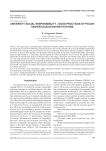
University social responsibility - good practices of polish higher education institutions
Статья научная
All organizations, including Higher Education Institutions (HEIs), should be socially responsible. Therefore, the article aims to answer the following research questions: How are the principles of social responsibility implemented by Polish HEIs? Through what good practices are they manifested? What formal national regulations support these activities? To answer those questions, the principles of the Declaration of University Social Responsibility and of good practices implemented by 23 universities, the first signatories of this Declaration, were reviewed. The applied research method has incorporated the analysis of the literature on the subject, documents and websites of the above 23 universities. The study presents the essence of university social responsibility and the special role of universities in promoting and implementing the principles of sustainable development and social responsibility. The activities of the Polish public administration in partnership with the representatives of HEIs, businesses, NGOs which led to the creation of the Declaration of USR were outlined. Examples of good practices applied by the examined universities and the ensuing conclusions were briefly discussed.
Бесплатно
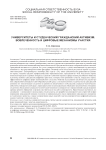
Университеты и студенческий гражданский активизм: вовлеченность и цифровые механизмы участия
Статья научная
Статья посвящена рассмотрению роли университетской среды в формировании гражданского активизма студенческой молодежи. Актуальность темы исследования связана с возрастанием значимости третьей миссии университетов, а также с расширением участия студенчества в гражданских практиках в условиях цифровизации технологий взаимодействия населения и власти. Предлагается выделить широкий контекст анализа гражданской активности студентов, без учета университетской среды, и узкий, связывающий студенческую активность с внутриуниверситетскими факторами. Основой статьи послужили результаты опроса студенческой молодежи г. Екатеринбурга в сентябре 2023 года (n = 531), также дополнительно привлекаются данные по опросу учащихся средних профессиональных образовательных учреждений (n = 673). Результаты опроса позволили определить уровень интереса студентов к событиям в разных сферах жизни российского общества и региона, выявить гражданские цифровые практики, в которых они принимают участие, определить оценку эффективности цифровых форм взаимодействия с властью. Новизна исследования заключается в рассмотрении современной университетской образовательной среды с позиции влияния студенчества на гражданский активизм и в типологизации студентов по уровню их вовлеченности в обсуждение социально-политических событий в университетской среде с преподавателями и однокурсниками. Выявлено неоднозначное отношение студентов к обсуждению социально-политической тематики в университете и прожективной идее размещения сервиса прямого обращения к органам местной власти на сайте университета. Практическая значимость исследования - в возможности использовать его результаты для разработки университетских стратегий по формированию гражданской позиции студентов и первоначального опыта проявления гражданских инициатив в студенческих проектах, а также в определении новых моделей участия университетов в цифровой коммуникации студентов и структур власти.
Бесплатно

